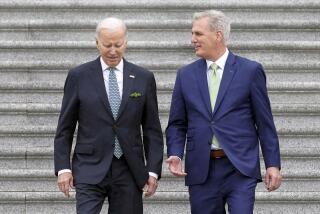Reagan Prods Conferees to Send Wall St. ‘Right Signal’ : Tells Them to Complete Work--Now
- Share via
WASHINGTON — President Reagan today exhorted budget negotiators facing a Friday deadline to press hard for a deficit-reduction agreement and send “the right signal at the right time” to Wall Street.
As Administration and congressional budget bargainers strove to put together the final details of an agreement and avoid automatic, across-the-board cuts under the Gramm-Rudman Act, Reagan said, “Now is the time for final action, and now is the time for fairness.”
“I urge the negotiators to produce a budget plan that is enforceable and gets the country on a path toward long-term deficit reduction,” the President said in a speech to the U.S. Chamber of Commerce.
“Whatever understanding is reached,” Reagan said, “it must bolster economic growth. That certainly means it must encompass more than simply extracting more money from the taxpayers’ pockets.
“While the final package may not be all that I might want, it will not be all that Congress wants either. But it is vital that the negotiators complete their work now.”
Month After Crash
Reagan’s speech came almost a month and a day after the stock market collapse that saw the Dow Jones Industrial Average plunge 508 points and half a trillion dollars worth of stock wiped out.
“Any agreement that comes from these sessions probably will not be the final word on reducing the federal budget deficit, but it will be the right signal at the right time and will show our determination to work together to solve this problem,” he said.
Earlier, White House spokesman Marlin Fitzwater said, “I think there’s a good chance that we’ll get an agreement today.”
He also said that Reagan had held a strategy session Wednesday with his advisers, Senate Republican Leader Bob Dole of Kansas and House Minority Leader Robert H. Michel of Illinois.
‘Wants an Agreement’
“The President is of the opinion that he wants an agreement, that it is preferable” to the automatic deficit-reduction provisions of the Gramm-Rudman Act, Fitzwater told reporters.
But he also said that problems remain “because we don’t have the assurance of enforceability” of the budget-cutting agreement.
But the spokesman sidestepped questions about what would happen if the negotiators fail, saying: “We want to talk about successes here. We’re talking about compromise.”
House Majority Leader Thomas S. Foley (D-Wash.), chairman of the bipartisan talks, said earlier in the day, “I think we’ll achieve an agreement, but there’s always a possibility that there could be a breakdown in the talks.”
“We are very close, except the clock is running out,” Sen. Pete V. Domenici (R-N.M.) said. “We keep coming together and just as we get there, just like the old spring on an old mattress, it pops up and then we back up and start all over again.”
Won’t Be a Parade
Democratic Rep. William H. Gray III said the negotiators may not come up with something “that Wall Street is going to have a parade about,” but the negotiated package would be better than allowing $23 billion in across-the-board cuts under the Gramm-Rudman law to kick in on Friday.
Foley and Domenici were interviewed on NBC-TV’s “Today” show and Gray on CBS-TV’s “Morning News.”
The bargainers, who were holding their 19th closed-door session, were hoping to shake hands on a proposal that would save about $30 billion in fiscal 1988, which began Oct. 1, and at least $45 billion more next year. About $9 billion in new taxes this year, and more next year, would be included.
Under the Gramm-Rudman Act, President Reagan is required by day’s end Friday to sign an order making $23 billion in spending cuts, half from military programs and half from domestic agencies, unless an alternative is enacted first.
More to Read
Sign up for Essential California
The most important California stories and recommendations in your inbox every morning.
You may occasionally receive promotional content from the Los Angeles Times.













